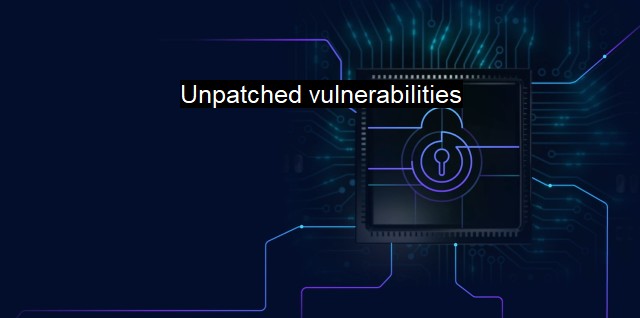What are Unpatched vulnerabilities?
Unpatched Vulnerabilities: Exploring the Risks and Solutions in the Ever-Changing Cybersecurity Landscape
"Unpatched vulnerabilities" in the context of cybersecurity refer to the weak points or gaps in a software system or an application left without a "patch," which is essentially an update or fix. These weaknesses are an avenue for exploiting a system. Antivirus/breach detection systems and firewalls play an integral role in warding off data breaches and managing cybersecurity threats. Yet, when there are unpatched vulnerabilities in these protection gauzes themselves, the entire network stands to risk of being compromised.Although software is generally written by seasoned professionals, creating an absolutely robust program that is immune to all forms of technical deterioration is nearly impossible. Software vulnerabilities arise from programming errors or glitches that open up a doorway for unauthorized access into a system, data corruption, and even taking control of a system entirely. When bombarded with a series of transactions or operations, the software fails, creating mild to severe disruptions; this is a direct impact of an unpatched vulnerability.
Typically, software vendors rectify identified vulnerabilities and come up with patches to address them, then proceed to send these patches to software users as updates needing installation. Unfortunately, many organizations and individual users procrastinate or disregard these updates, leaving them with unpatched vulnerabilities that could potentially affect the system. This primary reason for this procrastination can be the dull and monotonous process involved in patching - constant system restarts, application reboots, and slight to considerable decelerating of processes during the installation phase.
a more concerning issue arises when software vendors are either oblivious of a vulnerability in their product or when they have ceased supporting an obsolete version of the software, refusing to commit resources to troubleshoot or patch issues. Here, the software is left with unpatched vulnerabilities, bearing a glaring security threat.
In the sphere of cybersecurity, adverse entities known as hackers perpetually sniff around for such unpatched vulnerabilities. Black market forums broadly share intelligence on these vulnerabilities referred to as Zero-days as they exploit software weaknesses before the respective vendor becomes aware or succeeds in developing, testing, or disseminating a suitable patch.
Zero-days are a goldmine for these hackers as they guarantee easy access to different systems due to the non-availability of a corresponding patch. Police departments, national security agencies, news agencies and businesses are all prominent targets of these attacks - leading to varied damaging impacts, from leaking sensitive information to dismantling whole networks.
Antivirus plays an indispensable role in limiting the severity of these unpatched vulnerabilities. Updated antivirus software can detect and combat newly recognized viruses and worms that find their way into different data points via these vulnerabilities. Certain antivirus brands also ensure a protective layer, warding off hackers plan of exploiting an identified vulnerability.
Despite this, relying mostly on antivirus protection is not secure enough, for unpatched vulnerabilities continue to form kryptonite for data networks. Regular auditing to scout for these weak spots and proactively installing patches constitutes an important defensive practice against the escalating issue of unpatched vulnerabilities in the world of cybersecurity. By ensuring that their system software, applications, and antivirus are consistently updated, individuals and organizations can efficiently safeguard their system from ransomware attacks originating from unpatched vulnerabilities.
Unpatched vulnerabilities represent a nuisance in the digital world, spawning significant cybersecurity disruptions even in the most fortified of networks. They emphasize the critical need for constant software upgrades, system audits, and astute antivirus software vigilance as our digital footprint broadens and cyber-threat potential rises more than ever.

Unpatched vulnerabilities FAQs
What are unpatched vulnerabilities in cybersecurity?
Unpatched vulnerabilities are security flaws in software or systems that have been identified but have not yet been fixed by the vendor or developer. Cybercriminals can exploit these vulnerabilities to gain unauthorized access to sensitive data or systems.Why are unpatched vulnerabilities dangerous?
Unpatched vulnerabilities can provide a backdoor for cybercriminals to infiltrate and cause damage to a system or network. Attackers can use these vulnerabilities to steal data, install malware, or ransomware, or launch an attack that brings down the entire system.How can I protect myself from unpatched vulnerabilities?
You can protect yourself from unpatched vulnerabilities by ensuring that you have up-to-date antivirus and security software installed on your system. Additionally, it is important to keep all of your software and applications up to date and to monitor for any security patches or updates.What should I do if I discover an unpatched vulnerability?
If you discover an unpatched vulnerability, it is important to report it to the vendor or developer immediately. This allows them to investigate and provide a patch or update to fix the vulnerability before it can be exploited by cybercriminals.| | A | | | B | | | C | | | D | | | E | | | F | | | G | | | H | | | I | | | J | | | K | | | L | | | M | |
| | N | | | O | | | P | | | Q | | | R | | | S | | | T | | | U | | | V | | | W | | | X | | | Y | | | Z | |
| | 1 | | | 2 | | | 3 | | | 4 | | | 7 | | | 8 | | |||||||